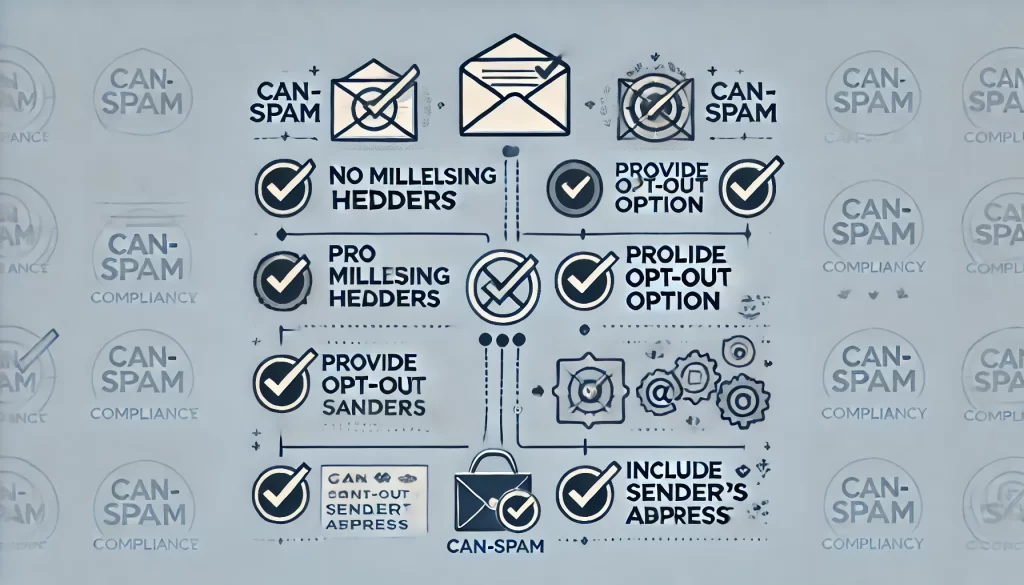What Are CAN-SPAM Laws and Why Are They Important for Businesses?
In today’s digital world, email marketing has become one of the most powerful tools for businesses to communicate with customers, promote services, and drive sales. However, this form of marketing also comes with a great deal of responsibility, particularly when it comes to compliance with regulations. One of the most critical laws that businesses need to be aware of is the CAN-SPAM Act. Established in 2003, the Controlling the Assault of Non-Solicited Pornography and Marketing (CAN-SPAM) Act aims to protect consumers from unwanted and deceptive email practices. The law sets guidelines for commercial emails and ensures that businesses act transparently, allowing recipients to opt-out of receiving unwanted emails.
For businesses, including law firms, compliance with the CAN-SPAM Act is essential. Violating the law can lead to significant penalties and damage to a company’s reputation. This post will provide a detailed overview of the CAN-SPAM law, its key provisions, and how law firms and other businesses can stay compliant.

Key Provisions of the CAN-SPAM Act
The CAN-SPAM Act is a comprehensive law that outlines several essential provisions that businesses must adhere to when sending commercial emails. Below are the most important requirements every business must follow to remain compliant:
Related Posts
No Deceptive Subject Lines or Sender Information
The first and most crucial provision of the CAN-SPAM Act is the requirement for businesses to avoid deceptive subject lines and sender information. Your subject lines must accurately reflect the content of the email. Misleading recipients with false or manipulative subject lines to get them to open an email can result in heavy fines.
The “From,” “To,” and “Reply-To” fields in the email must also accurately identify who is sending the message. If you send marketing emails under the name of your law firm, it’s crucial that your recipients can identify the firm from these fields.
Clear Identification of Commercial Content
The CAN-SPAM Act mandates that you identify your email as a commercial message. Whether your email promotes a service, product, or content, it should be apparent to the recipient that the email is commercial.
While the law does not dictate specific wording, it does recommend using clear language such as “Advertisement” or “Marketing” in the subject line or at the beginning of the message. This allows recipients to quickly identify the purpose of the email.
Opt-Out Mechanism
One of the most important provisions of the CAN-SPAM Act is the opt-out mechanism. All commercial emails must provide an easy and visible way for recipients to unsubscribe or opt out of receiving further marketing emails. The process should be straightforward and functional.
Unsubscribe links should be placed in a prominent position within the email (typically at the bottom). It’s also essential that unsubscribe requests are processed within 10 business days. Failing to honor opt-out requests could lead to significant fines, even if you’ve complied with other provisions of the law.
No Unauthorized Use of Email Lists
The law also prohibits businesses from using email lists that have been harvested or purchased from third parties without permission. For law firms, it is especially critical to ensure that any marketing list used for client outreach has been obtained legally. Consent from individuals is vital, and using unauthorized or purchased email lists can result in heavy penalties.
Accurate Header Information
The CAN-SPAM Act requires businesses to include accurate header information in their emails. This includes ensuring that the “From” and “Subject” lines are truthful and reflect the actual content and sender. Misleading recipients with false header information is considered a violation of the law.
Physical Business Address
Another key requirement under the CAN-SPAM Act is that businesses must include a physical postal address in every email. This can be your business’s street address or a P.O. box registered with the U.S. Postal Service. This provision is meant to ensure that recipients can reach out to the business if necessary, and it also adds a layer of legitimacy to the email communication.

Impact on Law Firms – How Law Firms Need to Comply with Email Marketing Regulations
Email marketing is an essential tool for law firms to attract new clients, maintain client relationships, and promote their legal services. However, law firms must stay compliant with the CAN-SPAM Act when sending marketing emails to potential clients, existing clients, or even industry professionals.
Failure to comply can result in hefty penalties and damage to a law firm’s reputation, which can have long-lasting impacts on business. Here’s how law firms specifically need to comply with the CAN-SPAM Act:
Related Posts
Client Communications
Law firms often send emails to clients with updates, newsletters, or event invitations. These emails must comply with the provisions of the CAN-SPAM Act. This includes providing an easy way for recipients to opt-out of further communication, using truthful subject lines, and including a physical business address in each email.
In particular, attorney-client privilege is essential in law practice. Therefore, law firms should ensure that emails containing sensitive information, such as case updates or legal advice, are sent securely and are not included in marketing communications. The CAN-SPAM Act doesn’t prohibit transactional emails, but law firms must still follow the rules for any promotional emails.
Email Campaigns and Legal Marketing
When law firms engage in email marketing campaigns to promote legal services or host webinars and events, they need to be cautious about obtaining permission from recipients. Building a reputable email list is essential, law firms must either acquire consent from recipients or send emails only to individuals who have expressed interest in their services.
The law also requires that law firms not only honor opt-out requests promptly but also keep records of consent and opt-outs to show compliance in case of an audit or investigation.
Third-Party Email Service Providers
Many law firms rely on third-party email service providers to manage their marketing campaigns. These providers often offer easy-to-use platforms for managing subscriber lists, creating email templates, and automating emails. While using such services can be beneficial, law firms are still responsible for ensuring that these providers comply with the CAN-SPAM Act. It’s crucial to work with service providers who prioritize legal compliance and provide features that allow law firms to implement opt-out mechanisms, include physical addresses, and ensure that client information is handled securely.
Learn How to Ensure Your Law Firm’s Email Marketing is Compliant with the CAN-SPAM Act
As a law firm, it’s crucial to ensure your email marketing practices comply with the CAN-SPAM Act. Failure to do so could result in substantial fines and reputational harm. If you’re uncertain about how to navigate the complex rules of email marketing, consider partnering with an experienced digital marketing consultant or agency that understands the legal requirements.
At Shmai.Com, we specialize in helping law firms create compliant and effective email marketing campaigns that build trust and drive results. Contact us today to learn more about ensuring your law firm’s email marketing strategy adheres to the CAN-SPAM Act.
FAQs
What is the CAN-SPAM Act?
The CAN-SPAM Act is a law that sets rules for commercial email marketing and establishes requirements for businesses, including offering recipients the ability to opt out of receiving emails.
How does the CAN-SPAM Act apply to law firms?
Law firms must ensure their email marketing campaigns are compliant with the CAN-SPAM Act by providing clear opt-out mechanisms, accurate sender information, and truthful subject lines in all marketing emails.
What are the penalties for violating the CAN-SPAM Act?
Businesses can face fines of up to $43,280 per email violation for failure to comply with the CAN-SPAM Act. Non-compliance can also damage a law firm’s reputation.
Can I send marketing emails to clients without their consent?
No, the CAN-SPAM Act requires businesses to either obtain consent from recipients or ensure they are only emailing individuals who have voluntarily opted in to receive communication.
Do I need to include a physical address in my law firm’s emails?
Yes, the CAN-SPAM Act mandates that businesses, including law firms, include a physical postal address or P.O. box in every commercial email.
Key Takeaways
The CAN-SPAM Act plays a crucial role in protecting consumers from unwanted emails and ensuring that businesses act responsibly in their marketing practices. For law firms, complying with the CAN-SPAM Act is essential to avoid penalties and maintain a reputable online presence. By following the law’s provisions, such as including opt-out mechanisms, accurate sender information, and a physical address, law firms can ensure that their email marketing campaigns are compliant and effective.
- The CAN-SPAM Act sets rules for businesses to follow when sending commercial emails, including transparency in sender information and offering an opt-out mechanism.
- Law firms must be mindful of these provisions to avoid penalties and reputational damage.
- Complying with the CAN-SPAM Act enhances trust and improves the effectiveness of email marketing efforts.
